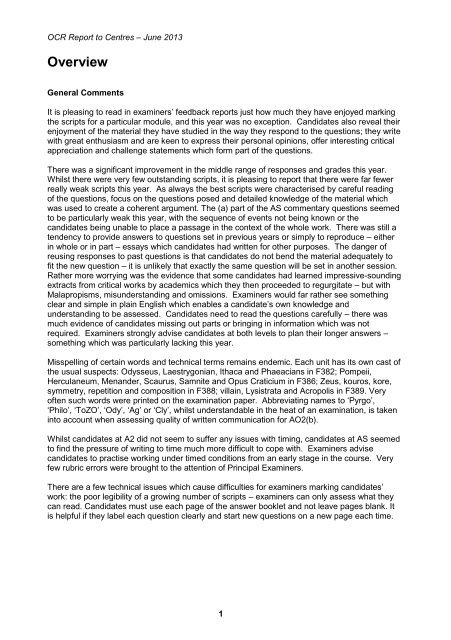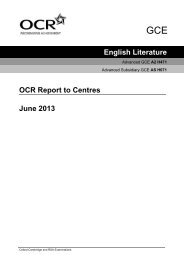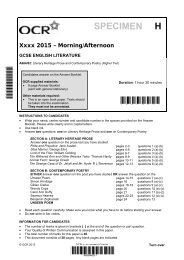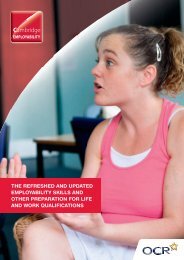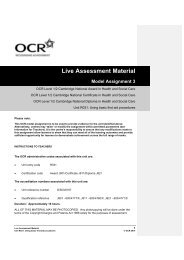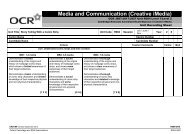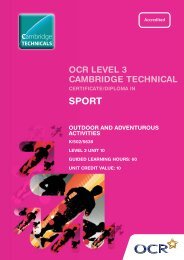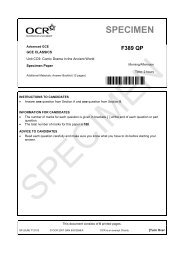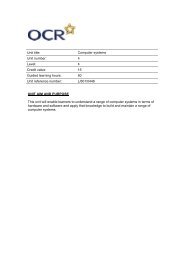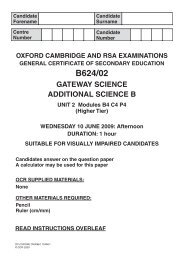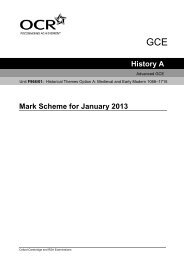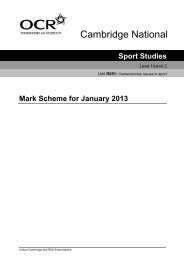Examiners' reports - June (PDF, 440KB) - OCR
Examiners' reports - June (PDF, 440KB) - OCR
Examiners' reports - June (PDF, 440KB) - OCR
Create successful ePaper yourself
Turn your PDF publications into a flip-book with our unique Google optimized e-Paper software.
<strong>OCR</strong> Report to Centres – <strong>June</strong> 2013<br />
Overview<br />
General Comments<br />
It is pleasing to read in examiners’ feedback <strong>reports</strong> just how much they have enjoyed marking<br />
the scripts for a particular module, and this year was no exception. Candidates also reveal their<br />
enjoyment of the material they have studied in the way they respond to the questions; they write<br />
with great enthusiasm and are keen to express their personal opinions, offer interesting critical<br />
appreciation and challenge statements which form part of the questions.<br />
There was a significant improvement in the middle range of responses and grades this year.<br />
Whilst there were very few outstanding scripts, it is pleasing to report that there were far fewer<br />
really weak scripts this year. As always the best scripts were characterised by careful reading<br />
of the questions, focus on the questions posed and detailed knowledge of the material which<br />
was used to create a coherent argument. The (a) part of the AS commentary questions seemed<br />
to be particularly weak this year, with the sequence of events not being known or the<br />
candidates being unable to place a passage in the context of the whole work. There was still a<br />
tendency to provide answers to questions set in previous years or simply to reproduce – either<br />
in whole or in part – essays which candidates had written for other purposes. The danger of<br />
reusing responses to past questions is that candidates do not bend the material adequately to<br />
fit the new question – it is unlikely that exactly the same question will be set in another session.<br />
Rather more worrying was the evidence that some candidates had learned impressive-sounding<br />
extracts from critical works by academics which they then proceeded to regurgitate – but with<br />
Malapropisms, misunderstanding and omissions. Examiners would far rather see something<br />
clear and simple in plain English which enables a candidate’s own knowledge and<br />
understanding to be assessed. Candidates need to read the questions carefully – there was<br />
much evidence of candidates missing out parts or bringing in information which was not<br />
required. Examiners strongly advise candidates at both levels to plan their longer answers –<br />
something which was particularly lacking this year.<br />
Misspelling of certain words and technical terms remains endemic. Each unit has its own cast of<br />
the usual suspects: Odysseus, Laestrygonian, Ithaca and Phaeacians in F382; Pompeii,<br />
Herculaneum, Menander, Scaurus, Samnite and Opus Craticium in F386; Zeus, kouros, kore,<br />
symmetry, repetition and composition in F388; villain, Lysistrata and Acropolis in F389. Very<br />
often such words were printed on the examination paper. Abbreviating names to ‘Pyrgo’,<br />
‘Philo’, ‘ToZO’, ‘Ody’, ‘Ag’ or ‘Cly’, whilst understandable in the heat of an examination, is taken<br />
into account when assessing quality of written communication for AO2(b).<br />
Whilst candidates at A2 did not seem to suffer any issues with timing, candidates at AS seemed<br />
to find the pressure of writing to time much more difficult to cope with. Examiners advise<br />
candidates to practise working under timed conditions from an early stage in the course. Very<br />
few rubric errors were brought to the attention of Principal Examiners.<br />
There are a few technical issues which cause difficulties for examiners marking candidates’<br />
work: the poor legibility of a growing number of scripts – examiners can only assess what they<br />
can read. Candidates must use each page of the answer booklet and not leave pages blank. It<br />
is helpful if they label each question clearly and start new questions on a new page each time.<br />
1


